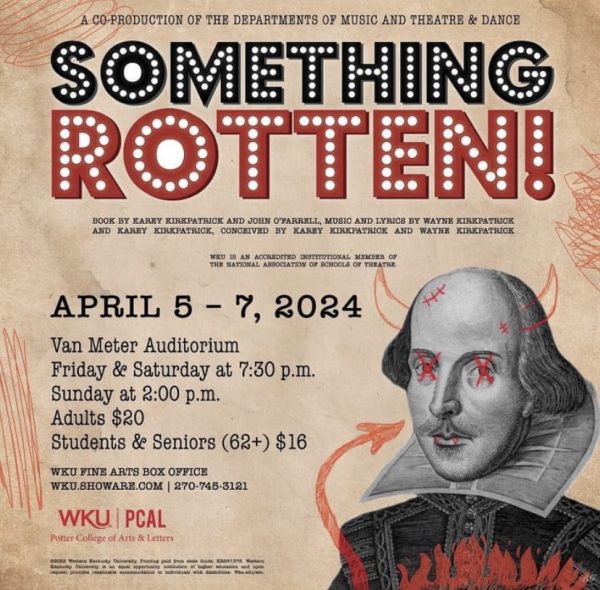Winner of literary criticism award discusses his book
March 27, 2017
On Christmas Day in 2016, Vidyan Ravinthiran received an email informing him that he won the Robert Penn Warren-Cleanth Brooks Award for literary criticism with his book, “Elizabeth Bishop’s Prosaic.” He was ecstatic, and described the news as “like an extra present.”
The Robert Penn Warren-Cleanth Brooks Award honors literary criticism that exemplifies the method of “close reading” of texts. The Center for Robert Penn Warren Studies at WKU collaborates with the Robert Penn Warren Circle, which includes the committee that chooses a winner for the award each year. The competition is open to any book that criticizes any genre, including poetry, prose, essays and drama. University presses are invited to submit work.
Ravinthiran, 32, is an English literature and creative writing professor at Durham University, which is his first full-time teaching position. This is his third year teaching at Durham.
Ravinthiran grew up in Leeds, England. He studied English at the University of Oxford and went to the University of Cambridge to get his master’s degree in eighteenth century and romantic literature. He was also a research fellow in Cambridge. He went back to Oxford to earn his Ph. D. It took him three years, from 2007-2010, to work on his Ph. D.
He wrote his book on Elizabeth Bishop for his Ph. D. because she is his favorite poet. He writes poetry, prose, and other works of his own and helps edit a website called Prac Crit, which specializes in interviews with poets and close reading of poetry.
During his years as an undergraduate at Oxford, he learned about Bishop and read her work. He then discovered more twentieth century American poetry through reading Bishop’s work.
Ravinthiran said he feels privileged to have won the award.
“I understand how much work it represents on behalf of the committee and all the books they had to read, and it’s very – I think, in a way, it’s sort of a privilege to spend so much time working on something and then to have people who care about what you care about really give your work that sort of attention and really pay attention to it,” Ravinthiran said.
Elizabeth Bishop’s Prosaic was published in 2015. Ravinthiran intended the word “prosaic” to be a play on the word “mosaic.” Also, because “prosaic” can mean “like prose,” Ravinthiran found it suitable because a lot of Bishop’s poetry is a lot like prose due to its length and style.
Ravinthiran said Bishop describes things in a somewhat casual way, “Then suddenly, these details become something marvelous and unexpected and beautiful, and somehow she’s able to put together these extended descriptions that don’t become tedious,” Ravinthiran said. “So it’s the kind of poem that, when you look at it, it seems like just about anyone should be able to do it, but when you actually try to do it, it’s incredibly, incredibly hard. So with a bit of that fascination with what didn’t seem to be possible for me, that made me really interested in her art.”
At first, Ravinthiran didn’t think his background impacted his book much, but he came to realize his background played a role in how he developed his book. As a child, he had a speech impediment, so his parents sent him to speech lessons. At the lessons, he started taking part in drama competitions and had to read poems.
This required a close focus on sound. Rhythm and pauses interested him in college because of his upbringing. In that way, his background is incorporated into his book because he talks about Bishop’s pauses and rhythms and how sounds come together.
On April 21, Ravinthiran will address WKU through Skype. He was invited to present a lecture at WKU but is unable to come in person due to travel and expenses.
Nicolette Bruner is a Robert Penn Warren fellow, so she is affiliated with The Center for Robert Penn Warren Studies. She is also a postdoctoral fellow in the English department. She is originally from Baltimore, Maryland. She described what the committee looks for in choosing a winner for the award.
“We look in general for criticism that exemplifies the kind of rigorous creative criticism that Robert Penn Warren and his associate and collaborator Cleanth Brooks performed,” she said. “In particular, we look for books that are vivid, relatable, loosedly-written and using close reading.”
Bruner feels the award honors the writers’ hard work.
“I think it honors that kind of painstaking care and attention to detail in the author’s work, because we’re truly honoring careful, thoughtful process,” Bruner said.
According to Bruner, she and the committee felt Ravinthiran met their standards “brilliantly well.”
Reporter Olivia Mohr can be reached at 270-745-6288 and [email protected]













![Students cheer for Senator at Large Jaden Marshall after being announced as the Intercultural Student Engagement Center Senator for the 24th Senate on Wednesday, April 17 in the Senate Chamber in DSU. Ive done everything in my power, Ive said it 100 times, to be for the students, Marshall said. So, not only to win, but to hear that reaction for me by the other students is just something that shows people actually care about me [and] really support me.](https://wkuherald.com/wp-content/uploads/2024/04/jadenmarshall-1200x844.jpg)




![Megan Inman of Tennessee cries after embracing Drag performer and transgender advocate Jasmine St. James at the 9th Annual WKU Housing and Residence Life Drag Show at Knicely Conference Center on April 4, 2024. “[The community] was so warm and welcoming when I came out, if it wasn’t for the queens I wouldn’t be here,” Inman said.](https://wkuherald.com/wp-content/uploads/2024/04/smith_von_drag_3-600x419.jpg)






